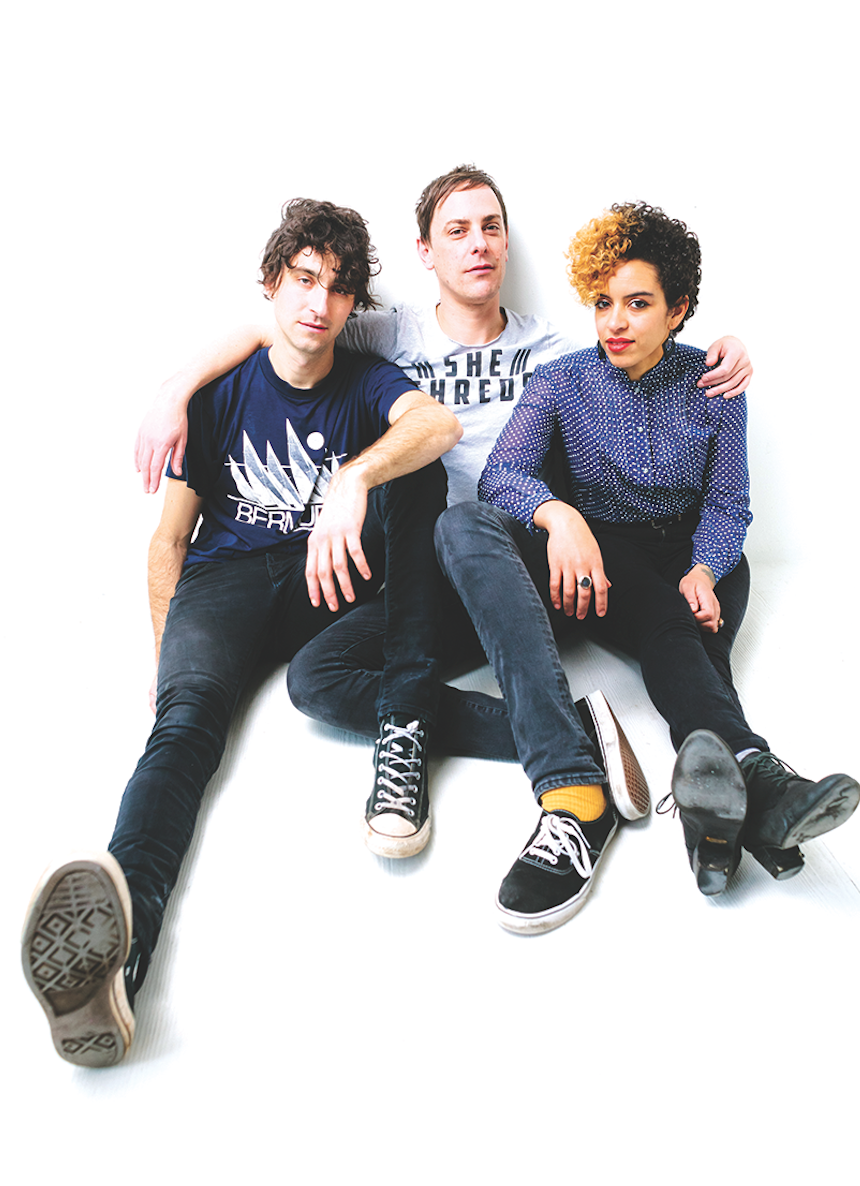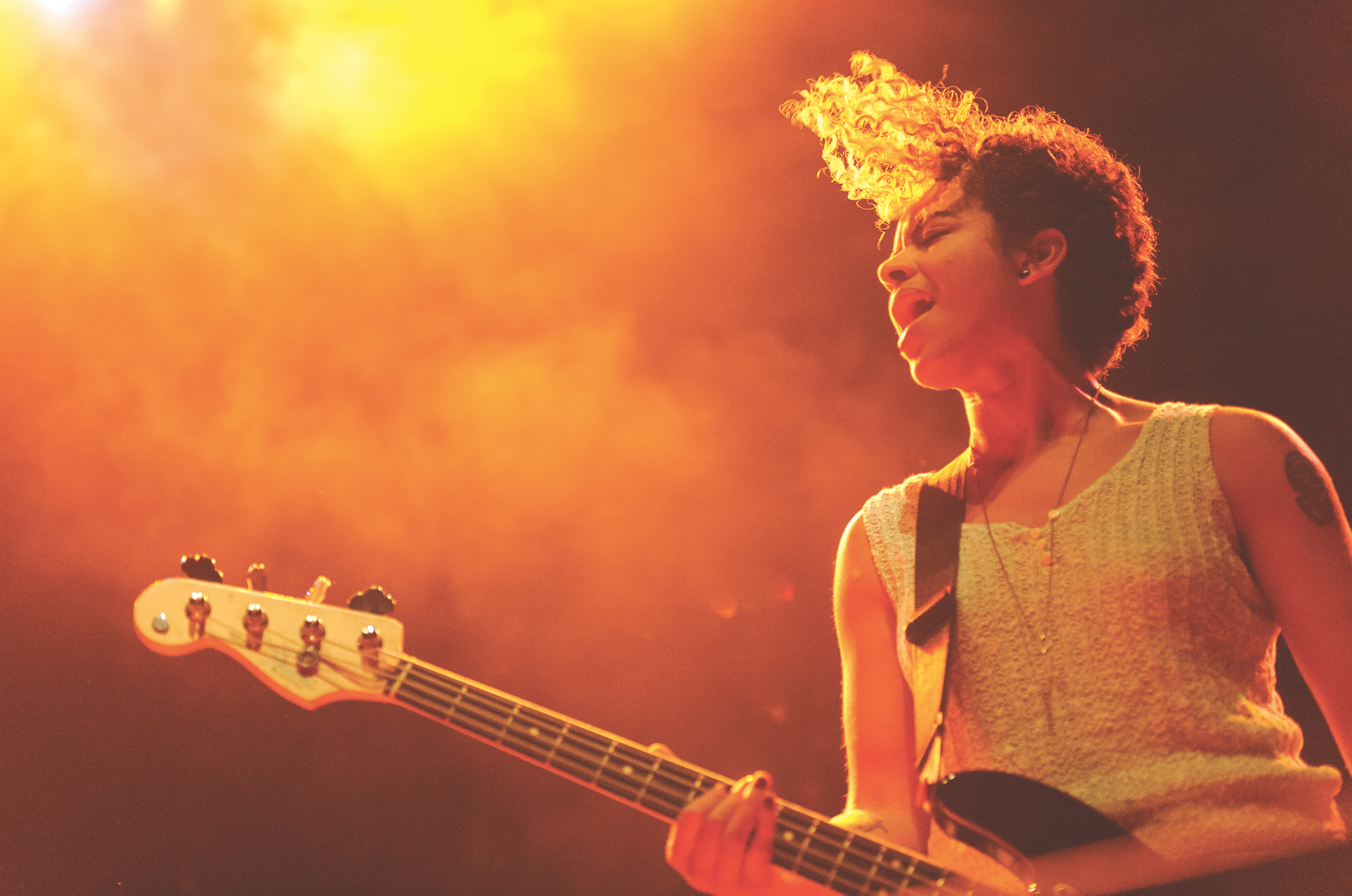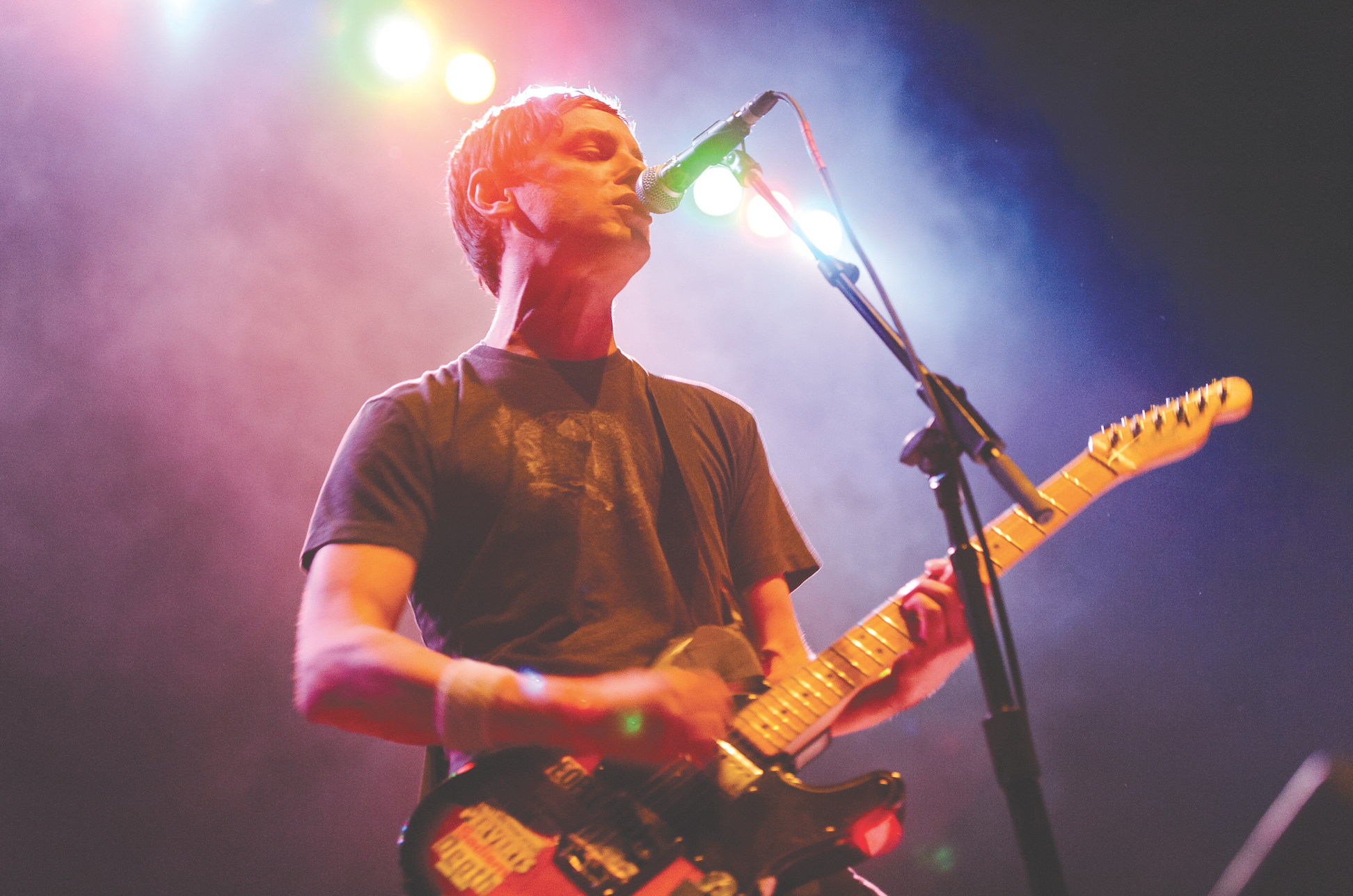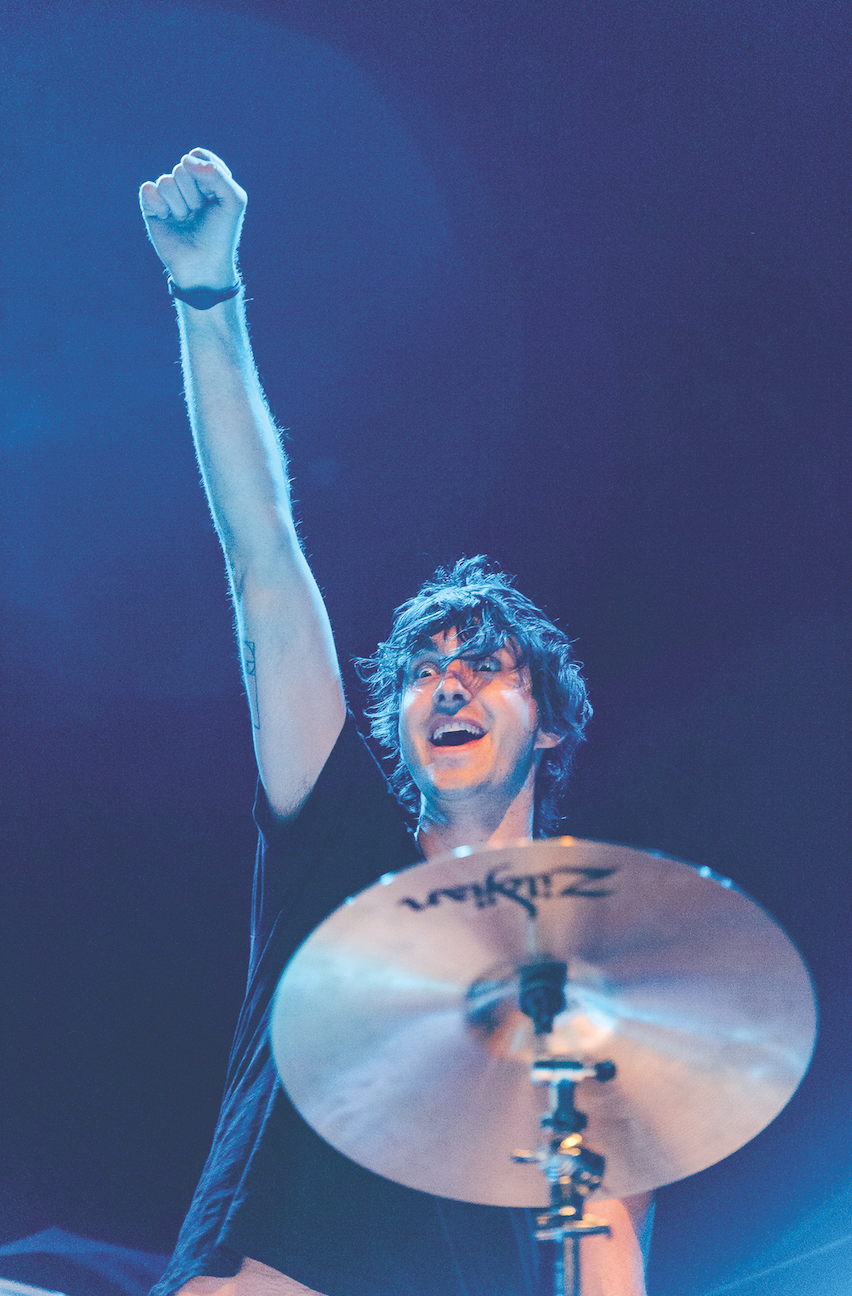The Thermals


The Thermals have long been a staple of the Portland DIY scene, bringing everything good, hopeful and lovable about pop-punk straight into the heart of the city. In the past decade and a half, they’ve played almost every all-ages venue in the city. At present, it feels like they represent the best of Portland’s fading, or shifting, allure for kids, for artists and for dreamers.
This year has been busy for The Thermals compared to the last several. Spring saw the release of their seventh full-length, We Disappear, on Saddle Creek Records. This newest release is everything you’d imagine a Thermals album to be — breakneck and pop-fueled at its core. It combines everything Thermals fans crave with the refined flare of producer Chris Walla (longtime, and now former, Death Cab For Cutie guitarist). We Disappear is a tried-and-true sampling of The Thermals last decade of sounds and themes.
2016 also marks the 10-year anniversary of The Body, The Blood, The Machine, a concept album focused on religion and politics. This anniversary is significant in that The Body, The Blood, The Machine is often cited as the album that launched The Thermals to indie music notoriety. Popular in a way that none of their other releases have quite matched, The Body, The Blood, The Machine is iconic, pristine in its abrasive pop-punk importance, a pillar of early ’00s youthful, angsty bliss.
After a tour this spring in support of We Disappear, The Thermals have been maintaining a low profile within Portland. On Oct. 23, however, they will be playing Revolution Hall with M. Ward, The Helio Sequence and Emily Wells as part of Rock for Rockwood, a one-day music festival supporting the Boys & Girls Club’s new Rockwood, Oregon facility.
We caught up with singer and guitarist Hutch Harris to discuss the changing landscape of Portland and the band’s plans for the future.
Eleven: You just celebrated the ten-year anniversary of The Body, The Blood, The Machine. How does that feel looking back?
Hutch Harris: It was cool for us. That record was just made by myself and Kathy Foster, and Kathy and I have played together for over 20 years. So it’s just another thing that’s really special to us. Recording was a really personal experience; it was just us and Brendan Canty, who produced. It was only the three of us in the studio the whole time. So, the memories for us are really special and personal. And also it’s the one thing we’ve done as a band that people like more than anything else we’ve done. Which is fine with us. It’s just nice to have done something that people like so much.
11: Save some lineup changes, with the perspective of ten years, how are things different for you personally and how are things different for the band?
HH: The crazy thing is The Body, The Blood, The Machine came out when we’d only been a band for three years. Those first three records came out really fast. And obviously there were a bunch of lineup changes in the first four or five years. We toured The Body, The Blood, The Machine for about two years, and then Lorin Coleman who was our drummer at the time quit the band when we were done touring in early 2008.
Then we met Westin Glass that summer. So he’s been with us since then, which is crazy to think that he’s been with us for eight years. So it’s just been the three of us for eight years and I’m really glad we’ve been able to keep the same lineup for that long. It gets exhausting and silly when the lineup keeps changing.
And we just love Westin so much and have loved him since we met him. We were auditioning lots of people who wanted to play shows with us, but we just knew right away when we met Westin. He’s a really great drummer and we just got along with him personally really quickly. So, I don’t know, for me, it’s always kind of changing how it feels. Sometimes it feels to me like we’ve been a band for so long and some days it feels like we’re just getting started and everything feels really fresh.

11: Is there any one thing that has been a continual inspiration for you to keep making music together instead of moving on to other projects?
HH: Kathy and I met when we were 19 and we’re from South Bay, California, so we just came from a really DIY punk scene, most of the shows we grew up going to were all just in places like library basements and people’s houses. And so even though we eventually signed to Sub Pop and got a booking agent, we had booked ourselves for years on tour, which is cool but it’s so much work and hard to keep doing.
But in a lot of ways we’ve tried to stay as DIY as we can and still do the things we’ve done. I recorded our first record, and I, or the band, collaborated and did all the art for our records. I’ve done all the press material. We’ve definitely stayed true to all the things we wanted to do as a band. I never felt like anything got away from us. We just always kept control over the band and it always felt like exactly what we wanted to do with it. I feel really good about all the decisions we made, for better or for worse, every choice was 100 percent ours.
11: You mentioned that you grew up in a place that had a good DIY punk scene. How has it been living in Portland and watching it change, and more explicitly watching the music scene change?
HH: The weird part for us in watching the scene evolve is getting aged out of the scene. Not that anyone else did it to us. Sometimes we’ll be like, “There’s no more house shows,” and it’s like there are, we just don’t hear about them because we turned 40.
You get to a point where you can only know so much about what’s really happening underground because you’re just too old to be in the loop. When Kathy and I moved to Portland the club 17 Nautical Miles on Woodstock just opened, we saw a lot of shows at the Powerhouse in Hollywood. We lived in Northeast at 13th and Failing and there were so many house shows in that area. The Red and Black was really cool for years. Kathy and I played a lot of shows there with bands before The Thermals and then Meow Meow was a place we played a lot.
Portland has always been a hard city to keep all-ages venues in. A lot of it is the OLCC. A lot of it is hard in general because clubs get shut down a lot. It’s just hard to sustain. From what I know, Morgan [Troper] and Blake [Hickman] and the Good Cheer scene seem to be good at keeping all-ages shows happening. There’s a lot of stuff that I wish I knew more about but it’s hard to stay in the loop.
11: On the flip side then, from your perspective, is there anything happening in the music scene in the city that you’re excited about?
HH: I like guitar music. I like rock bands and I feel like for a while it was pretty obvious that the scene was just drone. It was really heavy on electronic music, which is cool, and there are a ton of great electronic bands. But overall I’d rather see a rock band play as opposed to someone with a laptop. And I feel like right now there are a lot of good bands that I’ve seen. I also go through periods where I just like to hide out when we get back from tour, but then I’ll get back in the swing of going out and going to shows. Right now I just think there’s a ton of good bands in Portland.

11: Earlier this year you released your seventh album. Was there an overarching theme, or is it just a collection of songs you’re really proud of?
HH: There’s definitely not a story told as there are on other records. It’s definitely about love and death, but that’s what most of our albums are about. It’s kind of a breakup record. There are a lot of songs about breaking up. It’s about separation: people separating from each other and people separating from life and the world when you die. We didn’t want it to be a concept record. We didn’t want anyone listening to feel that they had to be paying attention to some narrative. We wanted it to be a more relaxed experience in that way.
I always work really hard on the lyrics, but specifically for this record we talked a lot about sounds and we wanted the style of each song and the sound of each song to be really different from one to the next. Definitely on past records we had wanted every song to sound the same pretty much, like a Ramones record. But we definitely wanted a more varied record with this one.
11: I know that you and Kathy typically do the album artwork. What was your inspiration and process for putting together the art for this album?
HH: Since the title is We Disappear I was putting together images that kind of felt like you were looking back on the past. What I usually do and what I did with this is put together a ton of collage stuff. I have a little studio at my house. I’ll just put together a bunch of pieces and have Westin and Kathy come over and see what they like and talk about it to see what direction we should go.
I love doing the album art because it’s such a fun process and it’s a lot more relaxed than writing and recording. And there’s such a time crunch too in the studio to get all the tracks recorded, whereas you can take a lot of time with the art. And I always really want the art to match the songs and the sound of the record. I feel like this one definitely does.
A lot of times it comes down to color too. Like if the colors go with how the record sounds. This is something that Westin and I will talk about more than Kathy … Kathy will just kind of think we’re crazy. But usually we’re saying, “This record sounds very blue and purple and whatnot.” Which is how we felt about this one, and Kathy will be like, “If you feel that way.”
11: In terms of recording, with this album being your seventh, do you feel that the recording process has gotten easier in any linear way or is it unique every time?
HH: I think it’s unique every time, but it is somewhat easier because we learn a lot every time we do a record. I feel like now that this band has worked so much together we know ourselves better and we know ourselves as a band better. We know how each other work.
In the past, and I know a lot of bands work this way, you show up to the studio, you set up and you’re like, “We’re gonna do this song,” you play it once and then you go back and listen to it in the control room. And you’re like, “It’s not quite it,” and you go back and record it again and then you go back and listen. To me that always felt like it made the band more uptight and it never got the best results. We get the best results when everyone is relaxed and not worried about how it sounded.
So, for this record I was like, “Why don’t we just go in and play a song three or four times in a row and we won’t go into the control room and listen, we’ll just move on.” We were working with Chris Walla who has recorded most of our records. He loved that idea and he had never worked like that and he really liked it and we really liked it. The first couple days we didn’t go back into the control room, we would just pick a song, play it three or four times, record all the takes and keep them and then after a couples days we went and sat on the couch and listened to everything. It was such a better way to work. It took a lot of the pressure off and allowed us to play freely and not get too uptight about the songs.

11: Do you think that’s how you’ll record in the future then?
HH: Definitely. Because any time you go back in the control room everyone is analyzing the song and analyzing their own performance and then you can feel everyone start to clench up and you don’t go back into the studio relaxed. All you’re thinking of is the mistakes you made and how you won’t make those mistakes again and then everyone stops playing naturally and starts trying to correct mistakes.
11: You guys are playing the Rock for Rockwood benefit show pretty soon. Do you guys have anything else coming up that you’re looking toward in Portland?
HH: We’ll play the East Coast and play a few shows, but I’m most looking forward to the Portland show. We played the Wonder Ballroom earlier this year and that was awesome, but we don’t play Portland a ton. We specifically try to not play Portland too much. We don’t want to overplay because it’s our hometown and we always want it to be a special occasion when we play in Portland. And Helio Sequence, those guys have been friends with us for a long time and we love them. And then Matt Ward we’ve known for a very long time. Our first drummer, Jordan Hudson played with Matt before The Thermals even started. And Matt is another person who doesn’t play Portland very often at all, so it’s a really special occasion when he plays. I think it will be a really special show.
– Sarah Eaton



